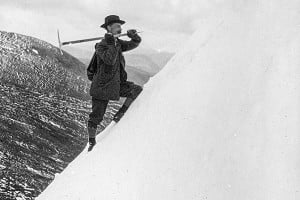
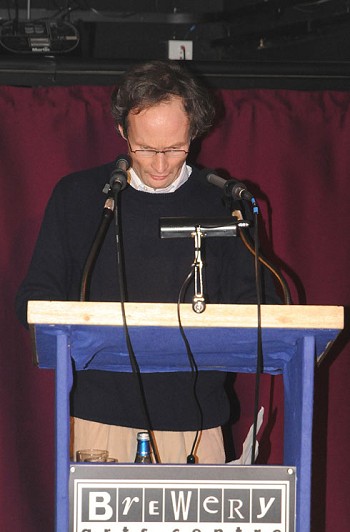
So it is a matter for celebration in itself that the friends and relations of Pete Boardman and Joe Tasker who set up this award turned out to have astute judgement. Pete and Joe died on Everest in 1982: 27 years ago. It seems impossible that it's so long. But long enough, surely, that we can now be confident their reputations will outlast us. A nice thought, I hope you'll agree. And I'm thinking not just of their reputations as mountaineers, or as characters – and two very different characters too, as I remember them – but as writers.
Not that this makes the task of the Award judges any easier. Dr Kym Martindale, poet and English academic, Ian Smith, much-loved editor and stalwart of the British club scene, and I are charged with finding not just the best book of the year – whatever “best” may mean – but a book worthy to stand alongside Pete and Joe's.
Also, of course, a literary book. This is a literary prize. And I want to say something about that, because for some of us at least, “literature” conjures up not altogether happy memories of school English lessons, when it seemed to mean all that stuff you were told to read, that perhaps you felt you ought to read, but that was somehow – well, not quite what you wanted to read. How many of the young have been caught clandestinely reading literature under the bedclothes by torchlight? How many Booker prize winners languish unread in the most prominent positions on people's shelves?
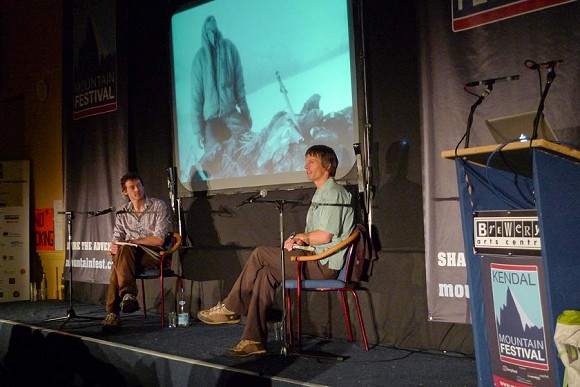
So I should say what this year's judges think “literature” means. It means a serious attempt to celebrate, explain, convey, something of human experience, and to do so as faithfully and completely as possible. And since human beings are complex,contradictory,and puzzling animals,literature will inevitably partake of the same characteristics. It will be complex – and perhaps difficult.
There were 31 submissions for this year's prize, equalling the record entry of 2006. We had entries in every major genre except poetry. And we had, interestingly, a clear geographical bias. No less than half the shortlisted books, and several of the others, find their inspiration in the Pacific north-west, in the northern latitudes of Alaska and the Canadian Rockies.
Before coming to the shortlisted titles, I would like to briefly mention one of two others we particularly enjoyed. In the field of escapist adventure fiction, Patrick Woodhead's The Cloud-Maker is a tremendous yarn in the tradition of Lionel Davidson. Richard Sale's Mapping the Himalayas is a generous production, which will feed the nostalgia of anyone who feels envious of the nineteenth century explorers, and it boasts a particularly well-chosen collection of historical photographs. Robert Marshall has made it his task to champion Walter Bonatti's case vis a vis the drama surrounding the first ascent of K2, and in K2; lies and treachery he brings this research definitively together. The book is not on the shortlist because we did not think it contained enough original material, but we salute Marshall's work and we think every serious historian of mountaineering will want this book on their shelves. Whatever the precise truth, to be reminded of the most important matter, namely that Bonatti was one of the very greatest of twentieth century mountaineers, incomparably more important than either of his compatriots who reached the summit, is always welcome.
And lastly here, Kenneth Hanson's Himalayan Portfolios, a sumptuous collection of black and white photography and serious supporting essays. But for this Award, therein lies the problem; in a book of photographs, the photographs will be central, and this is a literary prize, and the writing must be central. Which invites the retort: can a book of photographs ever win? To my mind, only if the writing is so dense, so concentrated, that it forms the centre of the work even if it fills few of the pages. And the only obvious way to do this is poetry. Perhaps one day someone will enter a single poem, or small collection, covering say ten pages, with 90 pages of exquisitely chosen photographs to illustrate and support the text. Perhaps someone in this audience is currently working on such a book. I hope so. It could win.
And so to the shortlist of six.
Revelations is a highly readable and effective autobiography by rock athlete Jerry Moffatt, one of the major players in moving standards forward in British climbing in the 1980s. What makes Moffatt's story important is that this progress is powered not by equipment, not even by opportunity, but by attitude. We see climbing becoming professionalised, efficient, planned. In some memorable pages the author recalls a whole summer at Tremadoc as a teenager, frigging his way up climbs that are too hard for him; cheating, basically. The climbs include Void, on the Vector headwall. A couple of years later he comes back and solos Void. What makes such phenomenal progress possible is training. This book more than any other I have read made me sit back and wonder whether I too should consider some training. The climbing wall as a kind of middle-aged climber's Viagra, promising the rejuvenation of otherwise limp muscles. The prospect is tempting. There is, it has to be said, a question of eligibility with this book. The Boardman/Tasker is a prize for mountain literature and this is not about mountains at all, it's about crags. But of course, it's not that simple. Rock climbing and mountains have a long-established connection. There is also the matter of precedent. In the past, books about rock climbing have been accepted for this prize, and indeed have won it. In the end, we decided to stick with the established precedent, rather than overturn it.
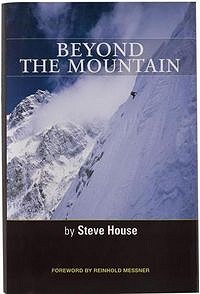
Beyond the Mountain is also an autobiography, that of one of the world's foremost extreme mountaineers, Steve House. House sets out to become the best mountaineer he can become. Surely he has succeeded. He then sets out to explain it all to us; and not just the danger, the pain, the effort involved, but the rewards. Does he entirely succeed in this? No; of course not. How could he? We are talking about the sort of commitment, the sort of suffering that, even in this room, is probably beyond the direct experience of most. House's commitment is exemplified by his outrageous solo climbs, including the second ascent of K7 in Pakistan. And yet it is one of the mysteries of this book that the value House claims to put on friendship does not ring hollow. On the contrary; I cannot think of a climbing book that better conveys the importance of friendship and mutual trust than this one. And this is only one of its many subtleties. House rejects false modesty and also rejects the technique of lightweight humour that some other very talented alpinists have employed in their writing in recent years. He is unashamedly serious. And yet he not only keeps our interest; he succeeds - and we regard this as very telling – in eliciting our sympathy. We want him to succeed.
Such is not the case with many of the current Everest authors. We want them to fail. How many self- congratulatory volumes of Everest adventures can we be expected to stand? This makes it a difficult genre for a specialist audience such as this one, if not for the public. My own prejudices, always healthily alive, were further strengthened when I saw that Dominic Faulkner's The Longest Climb not only had a puff from Bear Grylls – “An epic journey by an amazing man” – but was published by Richard Branson. But hold on. Stick with it. This is more than professionally written; it's an excellent travel book, relating the adventure of five people who bike from the lowest point on land, the Dead Sea, to Everest, where no less than three of them manage to get to the top. Sounds a bit like a premier division gap year project? Sounds completely artificial and pointless? Yes to both questions. But so what? All climbing challenges are pointless. Which is why we mountaineers are able to remain reasonably cheerful, in an age when some of our geographer colleagues seem driven to be noticeably grumpy. There is so much good writing in The Longest Climb, but what is really impressive is that the interest is maintained, even when we've slogged across Asia and arrived at familiar old Everest Base Camp, and even though, yes, it's the north ridge yet again. To make that climb the highlight, given that it follows a very good travelogue, is a first-class achievement. And again: we want him to succeed.
Another genre that can suffer from “in-crowd” prejudice is exemplified by Cairngorm John, the story of John Allen's half-a-lifetime involvement in mountain rescue. The mountain rescue fraternity and top climbers, in Britain at any rate, have not always seen eye to eye. There can be a difference of approach, a difference of values in some cases. But not here. Allen is a traditional mountaineer. He doesn't criticise when people make mistakes, not because he's diplomatic, but because he knows what mountaineering is. No reader will find his efforts and commitment to helping others other than totally admirable. But that's not why the book is on the shortlist. What impressed us was the way it was so cleverly underwritten. This is as civilised a book as one could write on the subject perhaps, but not ineffective. Some of these simply told dramas stay in one's mind. There is no infantile medical humour, and no suspicion, as there sometimes is with rescue books, of the author aiming to make money out of other people's tragedies. This is a fine testament to a great British tradition of voluntary service.
So to an example of perhaps the rarest type of mountain writing: the successful literary mountaineering novel. Rare, because it just seems to be so very difficult to write convincing mountaineering fiction. We think Jerry Auld has succeeded in doing so in his book Hooker and Brown, in which he takes three contrasting characters working in the Parks Service in the Pacific North West and sets them an intriguing tale: the existence or otherwise of the eponymous peaks, Mounts Hooker and Brown, located somewhere in the vast backcountry but still unclimbed. Of course, they have to go and find out for themselves. The technical quality of the writing in this book is of the first order. Auld has been published in magazines, but this is his first novel. We think the book displays a literary talent that could take him well beyond the confines of a mountaineering audience. But literary pyrotechnics, even when as impressive as here, are not enough, and this book also achieves what we think mountaineering fiction must do at all costs: it sets up questions which cannot be answered by other forms.
Finally, Deep Powder and Steep Rock by Chic Scott. This is the biography of Hans Gmoser, who in the early 1950s at the age of 19 emigrated, along with many other young Austrians, to Western Canada. For many years his dedication to the climbing life was not particularly remarkable - or rather, no more remarkable than that of many other young people with a taste for adventure and an extraordinary amount of drive. Gmoser ekes out a living of sorts, and in due course becomes a guide. And then, sort of by accident, sort of because the time is right, he invents the sport of heli-skiing and becomes a very rich man. It's a classic rags to riches tale, and very thoroughly told by Scott. One of the problems with biography is that you're really not meant to make it up, and though we can't be sure of every detail, this book reads authoritatively and we judge must have required more work to put together than any other on our shortlist. In addition, Scott knows the terrain extremely well, and it shows. As with House's book, as with Auld's, this is in considerable part a celebration of Canadian mountain experience. In general, Scott treads lightly on philosophical matters, making the somewhat angry exchange of letters between Gmoser and archetypal hobo and legend Fred Beckey all the more effective. I hardly need summarise: Beckey accuses Gmoser of selling out. Gmoser tells Beckey it's time to live in the real world, that everything must adapt. We've heard it all many, many times, but such important conversations can hardly be repeated too often. And Scott is far too wise to wade in and pass judgement.
Which is, of course, what I am about to do.
I have spoken a good deal about the criteria we have tried to use in coming to our judgement. But in the end, perhaps it is not so complex. There is one book in particular here which we all felt as soon as we finished it, we would want to read again. Not because it was hard to read, but because of the depth. It is a book we feel privileged to have read, and proud to have been asked to judge. And those seem to us good reasons to declare it the winner. We think it is an exceptional book.
Entirely worthy to stand alongside Pete and Joe's.
It is therefore with the greatest of pleasure that I announce that the winner of the Boardman Tasker prize for mountain literature 2009 is Beyond the Mountain by Steve House.



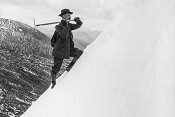
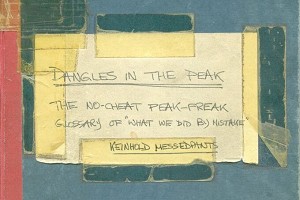
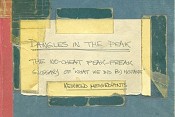










Comments